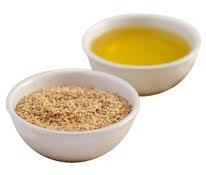Sesame oil has been used for centuries in Asian cuisine. It has also been commonly used for medicinal purposes, especially in Ayurvedic medicine. It has a subtle nutty flavor and is used both as a cooking oil and condiment. Sesame oil is made from toasted and untoasted sesame seeds, with the oil from toasted seeds possessing a stronger sesame flavor. Sesame oil also has many health benefits that make it a good alternative oil to use in moderation.
Good Fats
Sesame oil is high in monounsaturated and polyunsaturated fats. According to MayoClinic.com, eating foods rich in polyunsaturated fats helps cholesterol levels, lowers your risk of heart disease and reduces your risk for type 2 diabetes. Eating polyunsaturated fats has also been credited with reducing the risk for developing dementia. In a 2010 article in the “Journal of Alzheimer’s Disease,” researchers found that elderly people who consumed higher amounts of polyunsaturated and monounsaturated fats had a reduced likelihood of developing mild cognitive impairment, a precursor for dementia.
Vitamins
Sesame oil is a good source of vitamin E, which is an antioxidant. Antioxidants reduce damage from free radicals in the body. One ounce of sesame oil provides 75 percent of the recommended daily allowance for vitamin E. Sesame oil also contains vitamin K. According to Dr. Mercola from Mercola.com, current research on vitamin K suggests that it helps to prevent osteoporosis and to decrease the risk of cancer. Sesame oil also contains traces of minerals such as magnesium, calcium, copper, iron and zinc.
Blood Pressure
Consuming sesame oil on a regular basis has recently been linked with lowering blood pressure. A study published in the September 2007 issue of “Yale Journal of Biology and Medicine,” reported that sesame oil consumption on a regular basis lowered blood pressure, decreased the oxidative degradation of fats and increased antioxidant levels in hypertensive patients.
Antiviral and Antibacterial Properties
Sesame seed oil has been used in holistic healing for centuries, especially in Ayurvedic medicine. It is purported to have antibacterial, antiviral and antifungal properties. In holistic medicine, sesame seed oil has been used to treat streptococcus and staphylococcus bacteria as well as athlete's foot. Clinical studies are lacking to support these claims. The Food and Drug Administration has not recommended the use of sesame seed oil for medicinal purposes.
Uses
Sesame oil has a high smoking point of 410 F and is the least likely of such oils to go rancid due to its antioxidant content. Cold-pressed sesame seed oil can be used for deep-frying. Try substituting sesame oil for other oils in salad recipes or use it to sauté vegetables, chicken or fish. It adds a subtle nutty flavor. You can also take advantage of sesame oil's health benefits just by adding a teaspoon to smoothies.
| Botanical Name: | Sesamum indicum |
| Aroma: | Nutty and sweet |
| Properties: | Soothing, tranquilizing and sun screening properties |
| Health Benefits: | Eczema, Psoriasis, Blemishes, Stress, High Blood Pressure, High Cholesterol, Aching Muscles, Blurred Vision, Toothache |
Sources:
MayoClinic.com
http://healthyeating.sfgate.com - by Rose Haney, Demand Media
http://beauty.indobase.com

No comments:
Post a Comment